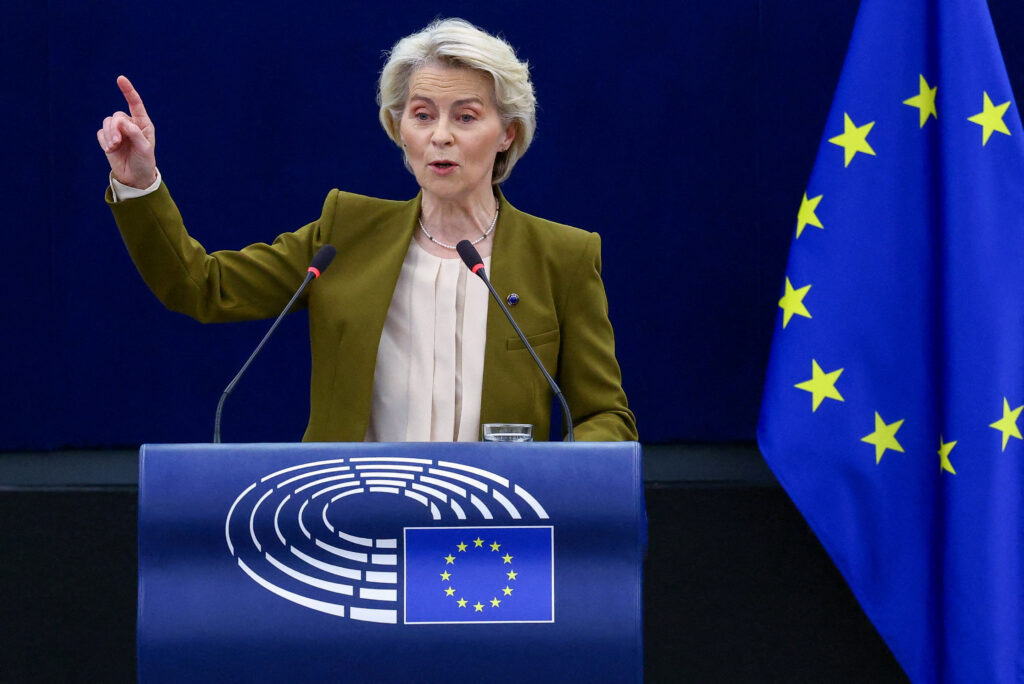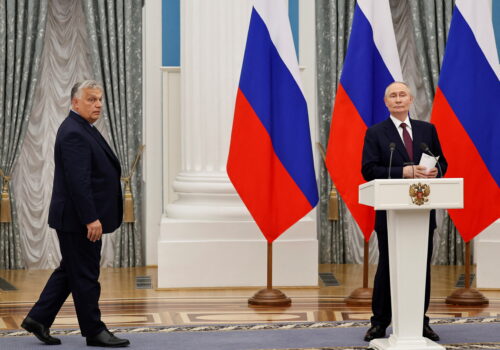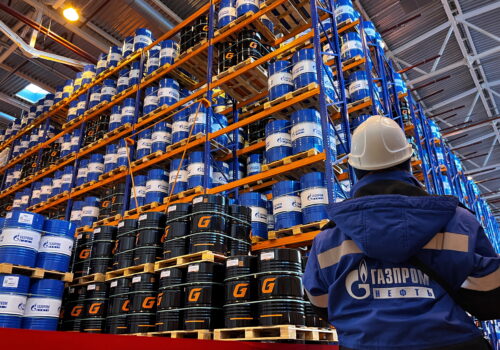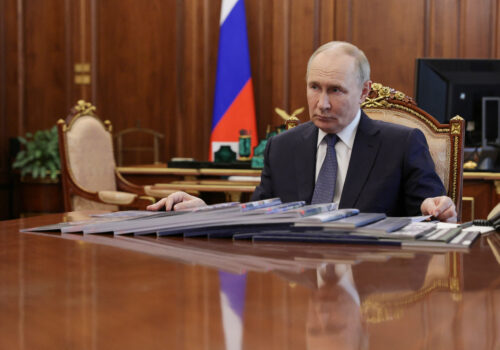Several measures in the European Union’s (EU’s) nineteenth sanctions package against Russia, which European Commission President Ursula von der Leyen announced on Friday, appear tailored to please US President Donald Trump. Yet perhaps the most important signal Brussels aimed to send was that the EU remains committed to phasing out the little that remains of Russian energy imports to the bloc.
Why?
Last week, Trump reportedly dialed in unannounced to a meeting between a delegation of EU sanctions experts and US officials, during which he called for the EU to enact steep tariffs on India and China. Then over the weekend, the US president posted on social media that NATO countries should place “50% to 100% TARIFFS ON CHINA, to be fully withdrawn after the WAR with Russia and Ukraine is ended.”
The most common take on Trump’s post is that he is asking for NATO (most of which are also part of the European Union) to do impossible things as a delaying tactic in order not to have to impose sanctions himself.
It is true that this administration takes a dim view of sanctions, which it sees as one of the reasons why countries are looking for alternatives to the dollar. It is also undeniable that Trump is reluctant to impose additional sanctions on Russia. His administration has explained that imposing additional sanctions would risk breaking the already thin ice on which negotiations rest.
And yet, according to the new etiquette of transatlantic relations, the Europeans accept that they must at least engage with Trump’s demands, even when the opening bid is outlandish. The EU and the United Kingdom are being asked to say to the world that they too are giving up on sanctions and adopting the United States’ weaponization of tariff policy. While their strategic dependence on the United States is well known, it is fundamentally against their interests to be perceived as so dependent that they have no say on their commercial relations with India and China.
The timing for a body blow to the Russian economy couldn’t be better.
The Commission’s proposals for the nineteenth package include a ban on liquefied natural gas purchases but do not yet commit the EU to removing the exemption granted to Hungary and Slovakia for Russian crude oil imports. On Friday, von der Leyen also spoke about the EU taking tougher stances on China and even India by targeting cryptocurrencies, banking, and energy firms that are helping Russia circumvent sanctions.
Given that Trump has set the bar so high, the risk is that he accepts nothing short of tariffs and even returns to musing about dismantling the current sanctions regime against Russia. But the Europeans should try to engage on what they know Trump really wants: reducing Russia’s energy exports to Europe while keeping global oil prices low. In this struggle, the volumes covered by the oil sanctions exemption for Hungary and Slovakia are small—about 500,000 barrels per day. To convincingly demonstrate its seriousness, the EU ought to find a way to phase these purchases out sooner, even if this means compensating the member states involved to avoid their vetoing the renewal of sanctions, which EU member states must do every six months.
Trump is right to focus on oil exports, as these have provided a lifeline to the Russian economy since the beginning of the full-scale war. However, as has been clear just as long, creating the expectation that Russian supply will be taken off the market increases prices, which benefits Russia. The Biden administration’s response was a price cap in late 2022 that has allowed India to buy more Russian crude using Western shipping and insurance, provided it was below the cap. High oil prices increase the temptation to cheat, so the cap hasn’t always worked, but there is still strong evidence the policy reduced Russia’s income from crude oil exports by $48 billion to $122 billion in 2023. Falling oil prices this year have allowed the EU to drop below the original sixty dollars per barrel to a floating cap of 15 percent below global market prices.
The EU’s offer to Trump therefore should involve more crackdowns on price-cap evasion, including tougher policing by EU member states such as Denmark of shipments through their waters. Instead of tariffs, the Europeans could also suggest threatening a joint secondary-sanctions regime with the United States, which might be daunting enough for Beijing and New Delhi to consider reducing their purchases of Russian oil and natural gas. Such an outcome could have a significant effect on the global oil market (much larger than ending the 500,000-barrel-per-day exemption for Hungary and Slovakia). The United States and the EU would need to anticipate carefully how oil prices might react to measures that could credibly reduce supply over a few months, and Washington may need to draw down from the Strategic Petroleum Reserve to cover any gap. It will take six-to-nine months for the United States to ramp up supply, and there are only a million spare Saudi barrels per day at present.
The timing for a body blow to the Russian economy couldn’t be better. It’s moved from overheating to recession in just six months due to low oil prices. This year’s deficit is likely to be double the moderate 2 percent deficits the Kremlin has managed since 2022. Government expenditures tend to pile up later in the year for Russia, so the fact that it is already faring much worse than previous years must have Moscow concerned. Reducing export income would push that deficit to a level that Russia cannot fully mitigate by depreciating the ruble, issuing domestic bonds, or raiding its already much-depleted liquid savings. The lower Russia’s export income, the earlier the Kremlin will have to cut spending, including on equipment and generous recruitment packages for soldiers.
Europe is performing a delicate balancing act—demonstrating commitment to Kyiv, relevance to Washington, resolve to Moscow, and rational self-interest to Beijing and New Delhi. The latter rules out following Trump’s instructions on tariffs, but alternatives that may still cause China and India to reduce their purchases of Russian oil and gas are available, provided the United States and Europe can coordinate their plans. And this will take some effort from Europe to reduce its own purchases.
Von der Leyen’s latest proposal on mobilizing the value of immobilized Russian assets gives renewed credibility to Europe’s commitment and resolve. Quite sensibly, the plan doesn’t cross the Rubicon of confiscating immobilized Russian assets in the EU—something most of the bloc has opposed despite US pressure. At the same time, this proposal could face difficulties, as it will bring new fiscal liabilities to member states that will be on the hook to protect the Central Securities Depositories where the money is blocked but Russia still has a claim. Nonetheless, von der Leyen’s proposal remains a very useful point for Europe to make at this juncture, signaling that Ukraine can count on an important stream of funding for the years to come if necessary.
Charles Lichfield is the deputy director and C. Boyden Gray senior fellow of the Atlantic Council’s GeoEconomics Center.
Further reading
Tue, Sep 2, 2025
Hungary has alternative energy options but chooses to rely on Russia
UkraineAlert By
Ukraine’s recent strikes on the Kremlin's Druzhba oil pipeline are not only an attack on Russia’s war economy. They are also a wake-up call for Hungarians highlighting the role being played by their country in the funding of Russia’s invasion, writes Aura Sabadus.
Tue, Aug 26, 2025
To end Putin’s war on Ukraine, Trump should sanction Russian oil
New Atlanticist By Kimberly Donovan
The US president is well positioned to bring about peace for Ukraine, but his administration needs to arm him with the best tools and options to do so.
Tue, Jul 29, 2025
The Russia pressure menu: Options to convince Putin to negotiate on Ukraine
New Atlanticist By John E. Herbst
As the US president cuts his deadline for Russia to ten days, there are several options for him to increase pressure on Moscow to pursue peace.
Image: European Commission President Ursula von der Leyen delivers the State of the European Union address to the European Parliament, in Strasbourg, France, September 10, 2025. REUTERS/Yves Herman/File Photo




